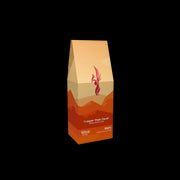Birch Chaga: The Punk Rock Superfood Growing on Tree Bark
If you’ve ever looked at a gnarly black growth on a birch tree and thought, “Mmm, that looks drinkable,” congratulations—you’re either a 16th-century Siberian healer or today’s wellness influencer. Enter Birch Chaga (Inonotus obliquus), the ugly mushroom with a cult following that stretches from Russia to TikTok.
This fungus has been brewed into tea for centuries across cold corners of the world (Russia, Korea, Northern Europe, North America) and is now marketed like it’s a potion brewed by Gandalf himself. Spoiler: modern science has actually caught up, and shockingly, some of the hype is legit. Let’s break it down—sarcasm included.
Health Benefits of Birch Chaga (Because Tree Fungus Is Apparently Good for You)
1. Antioxidant Properties – Free Radical Exterminator
You know how everyone’s terrified of “oxidative stress” but can’t explain what it is? Chaga steps in with more antioxidants than most of the mushroom family reunion. A study in the International Journal of Medicinal Mushrooms found Chaga packs serious antioxidant activity, outshining other fungi at the buffet table 【Mishra et al., 2013†https://pubmed.ncbi.nlm.nih.gov/23510282/】. Translation: it’s basically a free-radical hitman in mushroom form.
2. Immune System Modulation – The Goldilocks Effect
Too weak? Chaga gives your immune system a pep talk. Too strong? It tells your immune cells to chill. This “biological thermostat” trick comes courtesy of beta-glucans. A clinical trial published in the Journal of Ethnopharmacology reported that Chaga extracts could modulate immune responses in patients 【Balandaykin & Zmitrovich, 2015†https://pubmed.ncbi.nlm.nih.gov/25663986/】. Think of it as your immune system’s overbearing but ultimately helpful life coach.
3. Anti-Cancer Potential – Cue the Overhyped Headlines
No, it’s not a miracle cure. But lab studies suggest Chaga extracts can slow cancer cell growth and even push them into apoptosis (cellular suicide). A review in the World Journal of Gastroenterology broke down how compounds in Chaga interfere with tumor proliferation 【Zheng et al., 2010†https://pubmed.ncbi.nlm.nih.gov/21157970/】. Before you toss out chemo for tea, remember: this is promising, not prescription. Still, it’s cool when tree fungus intimidates cancer cells.
4. Anti-Inflammatory Effects – Arthritis’ Worst Enemy
Inflammation: the cause of everything from joint pain to your uncle’s Facebook rants. Chaga’s got compounds that put the fire out. A study in the Journal of Ethnopharmacology found Chaga extracts significantly reduced inflammation in animal models 【Kim et al., 2005†https://pubmed.ncbi.nlm.nih.gov/16198352/】. Translation: Chaga might help your joints feel less like rusty door hinges.
5. Cardiovascular Health – Fungus for Your Heart (Romantic, Right?)
Heart health isn’t sexy until you’re on cholesterol meds. Compounds in Chaga (like triterpenoids) may lower cholesterol, blood pressure, and risk of clogged arteries. Research published in Phytotherapy Research outlined its lipid-lowering effects 【Niu et al., 2016†https://pubmed.ncbi.nlm.nih.gov/26756243/】. Essentially, this mushroom is trying to be your cardiologist’s side hustle.
Flavor Profile: Not What You’d Expect from Bark Fungus
Despite looking like a lump of charcoal, Chaga doesn’t taste like a campfire accident. Instead, it delivers a surprisingly earthy, smooth, slightly vanilla vibe—the latte of the mushroom world. Brewed as tea or mixed into coffee, it leans rich and mellow rather than “forest floor funky.” Think less button mushroom, more woody-vanilla health elixir. No wonder wellness bloggers are gulping it down between yoga poses.
References (Because Science, Not Just Hype)
-
Mishra SK, et al. (2013). Antioxidant potential of Chaga. International Journal of Medicinal Mushrooms. 【PubMed†https://pubmed.ncbi.nlm.nih.gov/23510282/】
-
Balandaykin M, Zmitrovich I. (2015). Immune-modulating potential of Chaga. Journal of Ethnopharmacology. 【PubMed†https://pubmed.ncbi.nlm.nih.gov/25663986/】
-
Zheng W, et al. (2010). Anti-cancer activity and mechanisms of Chaga. World Journal of Gastroenterology. 【PubMed†https://pubmed.ncbi.nlm.nih.gov/21157970/】
-
Kim YO, et al. (2005). Anti-inflammatory effects of Chaga extracts. Journal of Ethnopharmacology. 【PubMed†https://pubmed.ncbi.nlm.nih.gov/16198352/】
-
Niu Y, et al. (2016). Cardiovascular protective effects of Chaga compounds. Phytotherapy Research. 【PubMed†https://pubmed.ncbi.nlm.nih.gov/26756243/】









